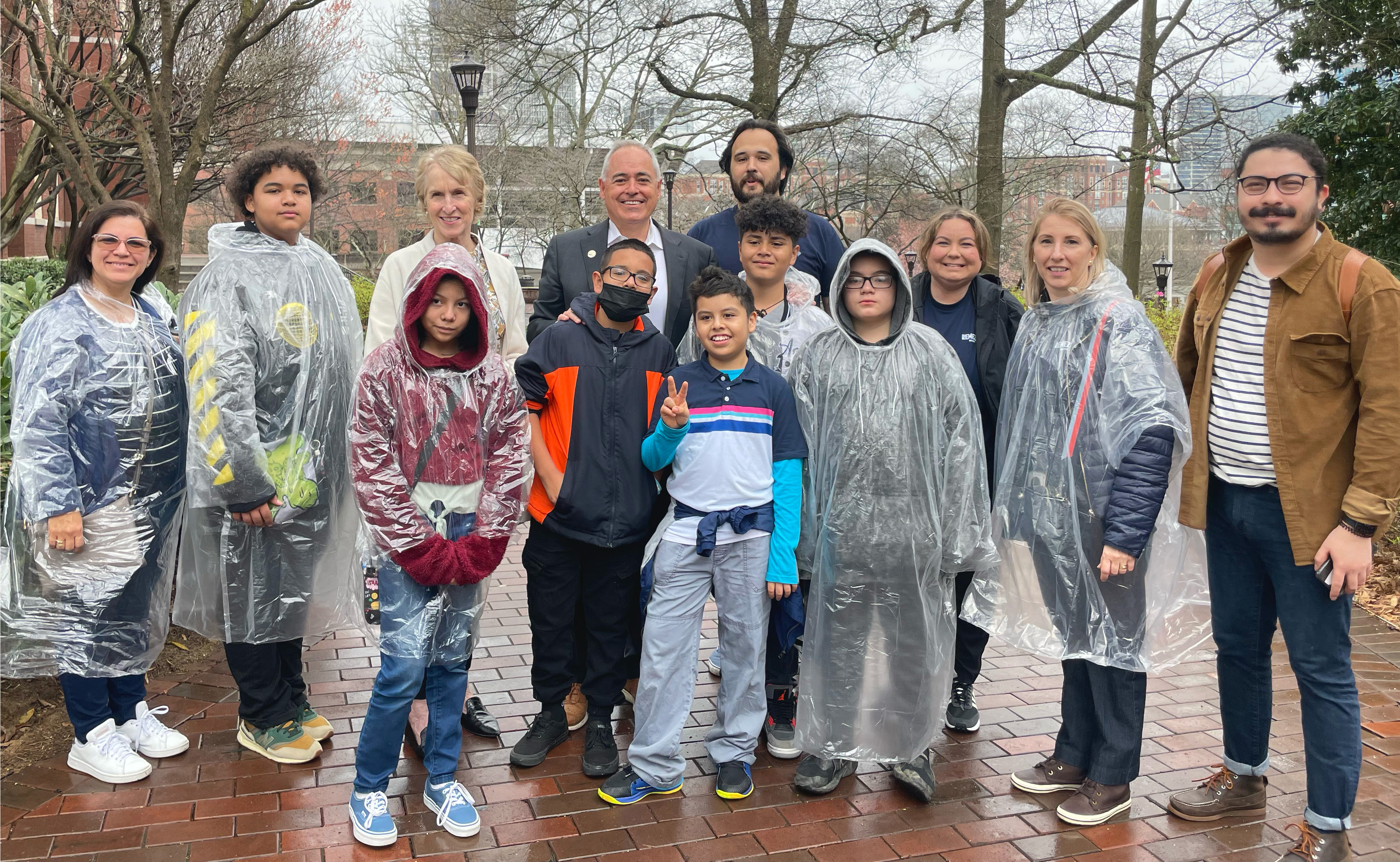
In late February, staff from the Center for Education Integrating Science, Mathematics, and Computing (CEISMC) hosted back-to-back on-campus field trips at Georgia Tech for the students involved in a weekly afterschool program of the REMEZCLA project, which is being led by research teams at Georgia Tech and the University of Puerto Rico (UPR) - Río Piedras.
In late February, staff from the Center for Education Integrating Science, Mathematics, and Computing (CEISMC) hosted back-to-back on-campus field trips at Georgia Tech for the students involved in a weekly afterschool program of the REMEZCLA project, which is being led by research teams at Georgia Tech and the University of Puerto Rico (UPR) - Río Piedras. Students from Berkmar Middle School in Gwinnett County and Lakeside High School in DeKalb County have been learning code and music composition by using EarSketch - a web-based digital audio workstation developed at Tech – through the REMEZCLA curriculum, which is specially designed to engage Latinx students.
Both groups of students started the day with a campus tour, learning about the history of Georgia Tech’s various buildings and the wide range of majors. They also toured the Flowers Invention Studio, a makerspace staffed by student volunteers from various majors, and learned about the tools and equipment available to the Georgia Tech community from 3D printing and laser engraving to metal cutting and woodworking for DIY projects.
“Seeing all of Georgia Tech was my favorite part,” said Alejandro Leon, a first-year student at Lakeside High School. “I had never been to a college campus before, and it was so cool to see it sort of in action and people everywhere with so much going on.”
The group then went on to enjoy lunch at West Village Dining Hall, ending the trip with a visit to the School of Music. Stephen Garrett, a research scientist with the Center for Music Technology, and members of the EarSketch team led an interactive discussion about the platform, which was co-founded by REMEZCLA’s Co-Pi and School of Music Chair Jason Freeman and School of Literature, Media, and Communication Professor Brian Magerko in 2011. Garrett listened to some of the students’ remixes and demonstrated on EarSketch how to fix any coding errors or add codes to achieve different beats in a certain pattern, for example.
“It was so fun to interact with the students’ projects and see their faces as we opened each of their Python scripts in EarSketch to explore and discuss their codes. We also showed off some of our own Python code that helps run the EarSketch platform,” said Garrett. “It was also great to show the students another side of music technology, interacting with audio and data signals to turn piano notes into control signals for a light display with our visit to Professor Frank Clark as well as seeing demonstrations from our undergraduate students to discuss their research.”
“Our goal for these field trips was to show the students the inner workings of EarSketch, which would hopefully generate more interest in their work within the REMEZCLA project,” said Michael Turner, educational outreach manager at CEISMC who has been serving as a coordinator and instructor for the initiative.
“While it wasn’t our main goal with these field trips, I think a pleasant surprise was how spending a day touring an exciting college campus and enjoying amenities like the student dining hall was a big motivator for the REMEZCLA students as they start to wrap up another academic year at their respective schools,” Turner noted.
REMEZCLA, formally known as “Collaborative Research Broadening Participation of Latinx Students in Computer Science by Integrating Culturally Relevant Computational Music Practices” is part of a $2.9 million National Science Foundation grant awarded in 2020. The research team, being led by principal investigators Diley Hernández, associate vice president for Institute Diversity, Equity, and Inclusion at Tech, and Rafael Arce-Nazario, computer science professor at UPR, are conducting this four-year study to directly address the lack of representation of Latinx and Spanish-speaking students in computer science and leading the program implementation in Atlanta and in San Juan.
“We are extremely proud to host the REMEZCLA students at Georgia Tech and create opportunities for them to explore our campus,” said Hernández. “When they visited the School of Music and talked to other Tech students there, it was beautiful to watch them realize that they can understand perfectly well what Tech students are working on, and how it was connected to what they did in EarSketch through their participation in REMEZCLA. These are very talented students but experiences like these can also be incredibly affirming and motivating for them.”
The current students have been involved in the REMEZCLA project since October of last year and are preparing to begin their final lessons of the curriculum this month.
—Michael Turner, CEISMC Communications